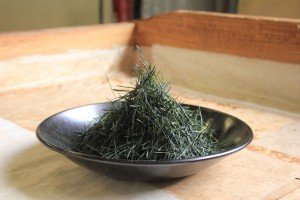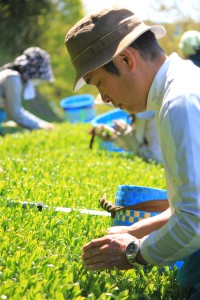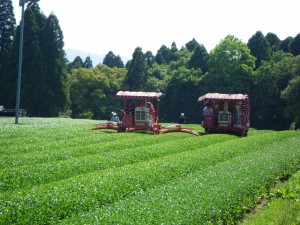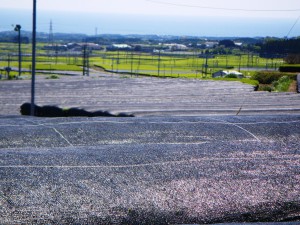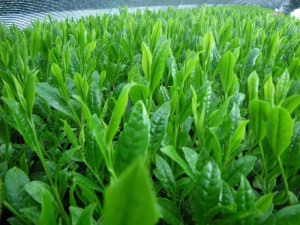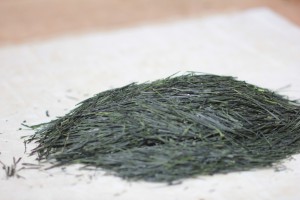煎茶(深蒸煎茶、浅蒸煎茶、手摘み煎茶、かぶせ茶、釜入り茶、番茶、ブロークンなど)
西製茶が創業より様々な研究と実践を費やしてきたのが煎茶です。農産物は自然の恵みです。天候や気温で毎年どうしても嗜好に差が生まれてしまいますが、日々の土壌管理や製造技術などで、出来るだけ自然障害に左右されない様に試行錯誤しています。
日本茶は春から秋にかけて2回~4回収穫しますが、早い収穫ほど柔らかく旨みが高く、遅い収穫ほど硬くあっさりとした茶になります。夏から秋にかけて病気や害虫はピークを迎えますが、欠点を作らず、様々な茶種や価格帯の茶が作れるのも西製茶の技術の魅力と言えるでしょう。
蒸し工程には一般的に大きく「浅蒸し」と「深蒸し」に分かれます。「浅蒸し」では香りが高くなり、「深蒸し」では味がまろやかになる効果がありますが、西製茶では独自の理論があり、両者の香りのピークで蒸し時間を決めます。その後、茶葉の温度を一定に、じっくり揉み上げていきます。
西製茶で出来る煎茶は、山の香りと旨みが高く、爽やかに仕上がります。
Sencha (Fukamushi Sencha: long-time steamed tea, Asamushi Sencha: short-time steamed tea, Tezumi Sencha: hand-picked green tea, Kabusecha: about a week to two weeks covered green tea, Kamairicha: pan-fired green tea, Bancha: coarse green tea, Broken: Broken green tea, etc.)
It is Sencha that Nishi Tea Factory has been spent various research and practice since its establishment. Agricultural product is a natural grace. There will be an absolute difference in taste every year in weather and temperature. We are trial and error in such day-to-day soil management and manufacturing technology so as not being influenced by the natural fault as possible.
Japanese tea is harvested twice to four times from spring to autumn. The earlier harvest, the softer and higher Umami tea will become. The later harvest, the harder and lighter taste tea will become. Diseases and pests from summer to autumn will reach its peak, but it is said the charm of the Nishi Tea Factory’s technology can make a tea of various species and price range without any drawback.
The steamed process is generally divided “Asamushi”: short-time steamed and “Fukamushi”: long-time steamed. “Asamushi” increase the scent of tea and “Fukamushi” has the effect of being mellow taste. But Nishi Tea Factory has its own theory to determine the steaming time at the peak of both scents. Then, we carefully roll and dry at a constant temperature of tea leaves.
Sencha made by Nishi Tea Factory has the mountain aroma, high Umami taste and refreshing.
抹茶 (碾茶)
碾茶とは、抹茶を挽く前の状態のものをいいます。圃場で遮光率の高い覆いを20日以上かぶせ、葉色を極限まで青くしたアミノ酸いっぱいの茶葉を利用します。
遮光は茶の樹勢を著しく弱らせてしまう行為なので、強い樹をつくることと、摘採後のケアが大切になります。
煎茶とは製造方法が異なり、蒸した茶葉を、一枚一枚高温であぶり上げます。茎や葉脈を取り除いて、臼で挽いたものが抹茶となります。
茶葉生産の難しさ故、オーガニックでの生産は全国でも稀小なものとなっています。
Matcha (Tencha)
Tencha is a dried green tea before grinding it to make Matcha. Tea leaves are covered with a high shading rate covering for 20 days or more in the field for making the utmost blue color tea leaves which is full of amino acids are used for Tencha. Since the light-blocking is a behavior that would significantly weaken to the vigor of tea, making a strong tree and care after picking becomes important. Tencha has different manufacturing methods compared to Sencha which is include rolling. Steamed leaves bring roasted one by one at high temperature. After removing the stems and veins from Tencha, which grind up by a stone mill become Matcha.
Because of difficulty of tea leaf production for Matcha in organic farming has been rare in the nation.
玉露
抹茶と茶葉の作り方は似ていますが、それを煎茶製造したものが、玉露になります。
抹茶の難しいところと、煎茶の難しいところを合わせたようなお茶なので、本物の香りや味をつくりだすのが非常に難しい製法です。オーガニックでの玉露は日本茶の究極と言ってもいいかも知れません。
Gyokuro
Making tea leaves of Gyokuro are similar to tea leaves of Matcha, but manufacturing methods of Sencha will be Gyokuro. Gyokuro is like a combination of difficulty of making Matcha and Sencha so that it is very difficult process that creates the authentic aroma and taste. Therefore making organic Gyokuro might be the ultimate Japanese tea.
有機栽培
有機栽培農産品とは、周囲から干渉を受けない状態で、無農薬、無化学肥料で育て、取り組みを第三者機関に認められた農産品をいいます。生産環境や販売トレースなど、非常に厳しい基準を満たさなくてはなりません。例えば、他の農家が近くで栽培している場合などは認められません。管理機や工場は機械を専用で分けなくてはなりません。
近頃ピックアップされがちな有機栽培ですが、西製茶では20年前から取り組みをはじめ、日々、技術と品質の向上に努めてまいりました。
現在では工場生産の約7割を有機栽培で、残りを特別栽培や無農薬栽培で生産しております。
Organic farming
The organic cultivation agricultural products is the thing that does not receive the interference from the surrounding such as growing in the absence of chemical fertilizer and pesticide-free that have been recognized by third parties. Getting certification needs to meet the very strict standards like the production environment and sales trace. For example, it is not allowed when other farmers grow something nearby. And also management machines and factories must be divided and used for organic only.
Organic farming has been attracts attention recently, but Nishi Tea Factory had started the efforts of making organic tea since 20 years ago with committing to the improvement of technology and quality day by day.
At the moment, about 70% of factory production is in organic farming, and the other is in a special cultivation and pesticide-free cultivation.

